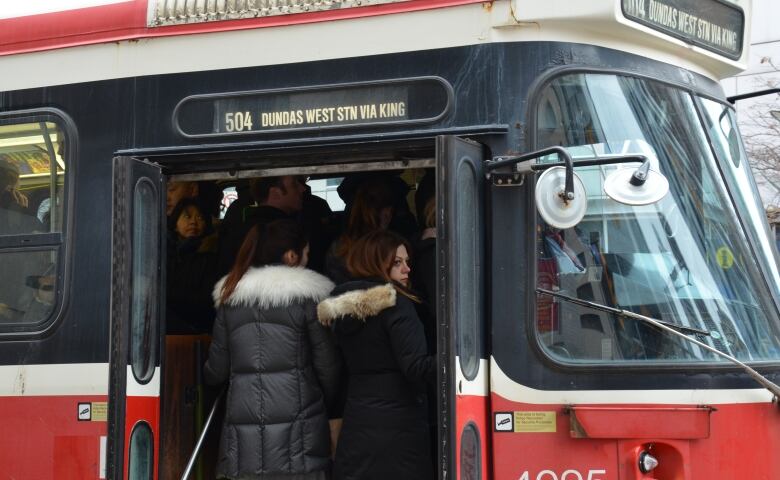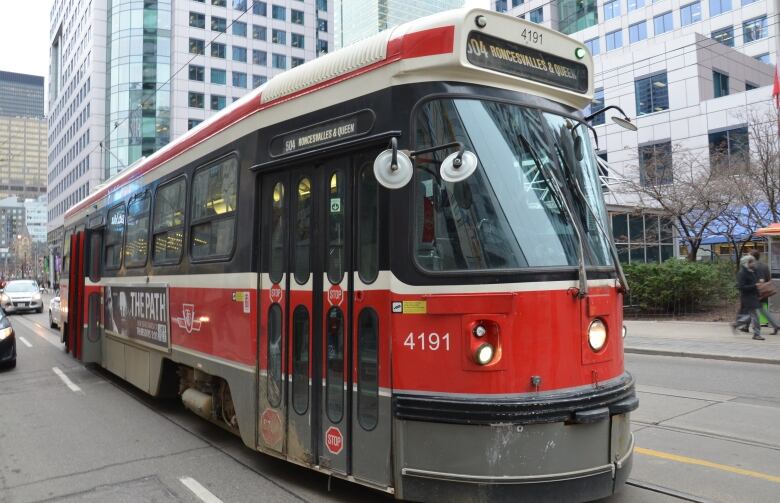Federal budget 2016: $3.4B will help, but big transit improvements are years away
Cities' long-neglected transit services need repairs, upgrades before any big expansions
It's just after five o'clock on a chilly Wednesday evening, and Klara Bergen is huddling with about a dozen other peopleon the corner of King and John streets in downtown Toronto.
They're waiting for the infamous 504 King streetcar. Or, more accurately, they're waiting for another 504 car. One already went by, but itwas full up. About 65,000 people will take this line today. It's the busiest surface route in Canada's biggestcity.
Bergen works nearby but lives in the city's west end. She rides the 504 most days.
- Liberals push deficit to spend big on families, cities
- 5 ways the budget turns back the clock on the Harper era
- Highlights of BillMorneau'sfirst budget
"It can be, well,let's just say it can be a bit frustrating sometimes," she says, pulling her hood tighteras the sundisappears behind condo towers. Her eyes keep darting eastward, searching for another streetcar in the distance.
"Packing on in the morning, doing it again at night. I guess I've gotten kind of used to it. Maybe things, though, could get easier?" she asks hesitantly.
It's a question on the minds of many Canadians who use public transit, especially in cities like Toronto and Montreal where overloaded and deteriorating networks cause a lot of headaches.
There's still going to be a disconnect between the level of funding and the level of need in a lot of places.- SteveMunro, public transit advocate
Prime Minister Justin Trudeau made big promises around public transit on the campaign trail last year, andthe day before Bergen was trying to catch a ride home, his government gave a glimpse intohow those promises might play out.
Nearly $3.4 billion was put aside for public transit in the federal budget tabled Tuesday.
Mayors across the country welcomed the news. Toronto Mayor John Tory said it was "very sexy, indeed" that cities would get more money for what Trudeau called"unsexy"infrastructureprojects like transit, whichcome with no ribbon cuttings, photo-opsor big political capital.

And, frankly, public transit operators like the Toronto Transit Commissionor Translink in Metro Vancouver will take whatever money the feds are willing to put up especially after years of "anti-city budgets" under the previous Conservative government, says Murtaza Haider,an associate professor at RyersonUniversity.
However, "meaningful changeis very unlikely to manifest itself in the next few years," he said.
'The bigger question'
That's because in a public transit context, $3.4 billion spread across the country over three years will only go so far. The TTC alone has a nearly $3 billion backlog of repairs and maintenance on its aging network.
"It's great that the federal government is back at the table, no question," said Toronto transit advocate and blogger Steve Munro. "But there's still going to be a disconnect between the level of funding and the level of need in a lot of places."
- Why Canada has fallen so far behind on public transit
- Canada'sunderfundedcities beg government to fix crisis
The new moneycan certainly be put to good use, though. If you've ever been late to work because of a "signal failure" in the subway, this is the kind of persistent problem transit operators will be looking to fix right away.
TTC chair and city Coun.Josh Colle said as much this week. The TTC, for example,expectsabout $880 million in federal dollars, money that will be focused on "what can be done quickly" with "the greatest customer impact."
"The bigger question will be: how does that money flow from the fedsthrough the province to us?" Colle said. "And when will it be in our hands so we can start to deploy some of those dollars?"
Those are especially interesting questions for all cities looking beyond the three years laid out in this budget. During the election, the Liberals said they would invest $20 billion into public transit over the next decade. (That's in addition to money already earmarked for transit by the previous government.)
The 'crazy ideas'
With only $3.4 billion on the table so far, the bulk of that $20 billion won't be spent until well after 2019.In other words, the kind of big expansion projects that the public often sees as real progress a downtown relief line in Toronto or the proposed rapid-transit line along Broadway in Vancouver are still years off.
Among the biggest obstacles to ambitious efforts moving forward is a shortage of money at the local and provincial levels. The traditional formula has been that each level of government pays for a third of the project.

Interestingly, the federal government saysit will pay up to 50 per cent to expedite projects that are"flexible to municipalities' priorities and requirements."
But Haider says the money should come with "strict conditions," forcing cities to abandon the "crazy ideas of local politicians who have only political expediency in mind."
"The government wants to promote local democracy, which is a good thing, but it's based on the assumption of due diligence at the municipal level," he said. "When large transit projects are decided by municipal governments, we rarely see decisions for the greater good."
The budget is short on details, so it's unclear exactly how the federal government will approach dishing out much-needed money. Big proposals on the table in cities around the country, though, will probably have to wait until more funds start to flow from Ottawa.














_(720p).jpg)


 OFFICIAL HD MUSIC VIDEO.jpg)
.jpg)



























































































